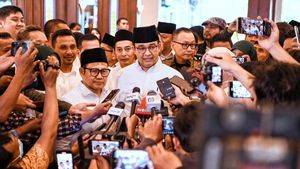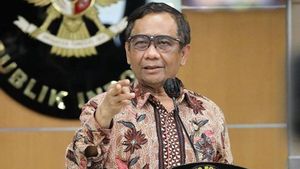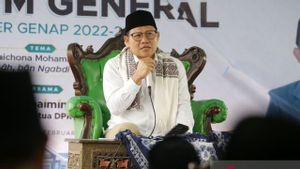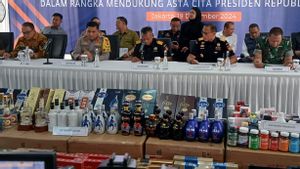JAKARTA - Chairman of the Indonesian House of Representatives, Puan Maharani, said that the abolition of the thesis as a condition for graduation for undergraduate students is a form of independence in learning.
"The thesis requirements are a heavy burden and sometimes limit the exploration of students' science and academic interests. A breakthrough is needed that can channel talents and interests, so that they are easily absorbed in the world of work," said Puan in her statement in Jakarta, Tuesday, August 5.
He considered the thesis in today's era to be something that limits academic exploration, and sometimes disrupts a wider learning process.
Currently, the thesis is no longer a graduation requirement for undergraduate students whose rules are contained in Permendikbudristek Number 53 of 2023 concerning High Education Quality Guarantee. In addition, undergraduate and doctoral students are also not charged with making a thesis and dissertation as a condition for graduation.
Instead, the government proposes that the final task can be in the form of a prototype or project so that it is not just a thesis, thesis, and dissertation. However, the decision was left entirely to the university where students studied.
Puan considers this a form of breakthrough made by the government.
"This is a form of independence in learning, so students are free to determine their graduation directions without having to rely on the existing system. Students will feel more challenged when they are given the freedom to determine their future," said the former Coordinating Minister for Human Development and Culture.
Puan added that independence in learning refers to the concept of education that provides freedom for individuals to learn according to their interests, abilities, and needs without excessive pressure or obstacles.
"This approach encourages exploration, creativity, and solving independent problems. So that students have greater control over their learning process, which can increase motivation and learning results," said Puan.
Furthermore, Puan said that flexibility in determining graduation requirements can help universities accommodate student changes and diversity. He assessed that the breakthrough was in accordance with the era of the times.
"High education must be responsive to the times. There may be universities that consider flexibility in graduation requirements as a step to accommodate the latest developments in the world of work and technology," he said.
Even so, Puan reminded the Ministry of Education, Culture, Research, and Technology (Kemendikbudristek) that they still have homework to prepare an effective monitoring mechanism in implementing the graduation requirements method at each university.
This system is needed to ensure that the quality of higher education graduates is maintained.
Because, when each campus has different requirements, this can cause inequality in education. Graduates from campuses who are easier or less stringent in terms of requirements can be considered less quality compared to graduates from campuses who are stricter in terms of requirements.
"Universities that have stricter graduation requirements can produce more competent graduates, while others may not have comparable qualifications. This will also affect universities in the eyes of employers," said Puan.
Therefore, Puan encourages the Ministry of Education and Culture and universities to work together in developing the right rules and mechanisms so that all graduates have equal knowledge and skills and are ready to enter a competitive world of work.
"In this way, we can maintain high standards of higher education quality in Indonesia, while enabling flexibility in accordance with the needs of students and the latest developments in the world of education and work," he explained.
On the other hand, Puan also wants strict supervision from the Ministry of Education and Culture to overcome risks and ensure that the flexibility in determining graduation requirements does not sacrifice the quality of education.
"The government must carry out routine audits at universities to ensure that the various graduation requirements still meet the quality standards that have been set," said Puan.
Not only that, Puan also hopes that the government can improve the skills and knowledge of lecturers so that they can determine the requirements for graduation that are suitable for students who are under their supervision.
VOIR éGALEMENT:
The English, Chinese, Japanese, Arabic, and French versions are automatically generated by the AI. So there may still be inaccuracies in translating, please always see Indonesian as our main language. (system supported by DigitalSiber.id)
Tags les plus populaires
#Prabowo Subianto #Nouvel An #Syrie #nataru #NatalPopulaire
19 Desember 2024, 06:15
19 Desember 2024, 05:00
19 Desember 2024, 07:00


















